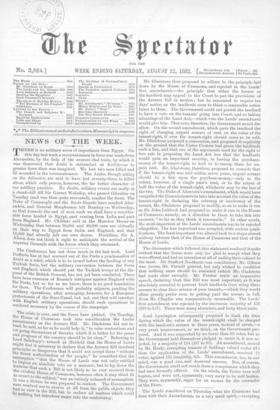The crisis is over, and the Peers have yielded. On
Tuesday, the House of Commons took into consideration the Lords' amendments on the Arrears Bill. Mr. Gladstone did not in- tend, he said, so far as he could help it," to raise contentions and set going discussions of theories which it'is better for the peace and progress of the country should be lot sleep." Referring to Lord Salisbury's remark at Hatfield that the House of Lords might find it necessary to declare that the Arrears Bill involved principles so dangerous that it could not accept them "without the direct authorisation of the people," he remarked that the assumption "that the House of Lords was not only entitled to impose an absolute veto on a measure, but to lay down the doctrine rine that such a Bill is not likely to be ever received from the existing House of Commons, however often it may think fit
to revert to the subject," was an entirely unheard-of assumption. It was a dictum he was prepared to contest. The Government were resolved not to swerve at all from the public objects they had in view in the Bill, but to eschew all matters which could do nothing but introduce anger into the controversy.






























